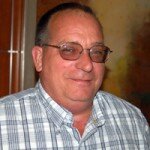
Joseph Broderick, MD, Director of the UC Neuroscience Institute, speaks during the campaign kickoff at the Lindner Family Tennis Center in Mason, Ohio. Photo by Joseph Fuqua II / University of Cincinnati.
Contact: Julie Engebrecht
(513) 556-9685
[email protected]
CINCINNATI – The University of Cincinnati Neuroscience Institute has launched a $123 million project that will include a new world-class outpatient facility for people with neurologic and psychiatric diseases, expand existing and create new research programs, enable recruitment of additional world-class physicians and researchers, support new training fellowships, and expand community-wide programming.
More than $30 million of the $54.5 million philanthropic goal for the project already has been raised.
The new facility will be a signature landmark on the main thoroughfare to the medical campus, and will be centrally located at 223 Piedmont Ave, the current site of the Piedmont Mews apartment complex. The building will be designed around a holistic and integrated patient-care model and will help expand services, enhance coordination of clinical care, seamlessly incorporate clinical research and innovative treatments and include supportive services such as rehabilitation therapies and integrative medicine.
Watch the campaign kickoff video >
“We envision a new hub for the UC Neuroscience Institute that will provide leading-edge, comprehensive care in a single location,” said Joseph Broderick, MD, director of the UC Neuroscience Institute. “The design and infrastructure will enhance our processes to more efficiently integrate research and education with clinical care and to improve the patient experience. In addition, it will provide space for educational workshops and seminars to benefit the entire community.”
About one in seven people will be affected by neurologic or psychiatric disease or injury in their lifetime. The UC Neuroscience Institute was established in 1998 through a partnership between the UC College of Medicine and UC Health. Its 11 centers of excellence and three programs treat patients suffering from Parkinson’s disease and multiple sclerosis, Alzheimer’s disease and dementia, depression and mood disorders, brain tumors and epilepsy, ALS (Lou Gehrig’s disease) and muscle disorders, migraines and facial pain, sensory dysfunction and acute injuries from stroke or trauma.
The UC Neuroscience Institute has become a leading treatment, research and teaching center for complex neurological conditions. It includes more than 100 faculty members from 15 clinical specialties working collaboratively. The institute also runs more than 100 active clinical trials at any given time, and has received more than $120 million in grant funding over the past five years.
“The funds raised in this campaign will support the three pillars of academic medicine – patient care, research and education – and will make a real difference in the lives of people today and far into the future,” said Richard Lofgren, MD, president and CEO of UC Health. “The challenge of treating complex neurological diseases requires multidisciplinary teams working together, side by side, to find ways to prevent suffering and find cures.”
By providing key funding, this campaign will also help attract and retain world-class physicians and scientists in Cincinnati.
“The UC Neuroscience Institute is a model teaching, research and treatment center, where the best and the brightest are pioneering new treatments and saving lives. Its success, and the success of the University of Cincinnati, would not be possible without the support of the Greater Cincinnati community,” said UC President Santa Ono.
Since its founding, the UC Neuroscience Institute has created national models for evidence-based treatment and research of complex neurologic conditions. It is a founding member of three elite NIH-funded clinical trial networks: StrokeNet, NeuroNext, and the Neurological Emergency Treatment Trials. In addition, it is the national coordinating center for StrokeNet, which directs all of the NIH-funded stroke trials in the United States.
“The UC Neuroscience Institute is another example of what can be achieved when an academic medical center, representing discovery, education and advanced clinical care, partners with an outstanding healthcare provider in UC Health,” said William Ball, MD, vice president for research, senior vice president for health affairs, Christian R. Holmes Professor and dean of the UC College of Medicine. “Funding from campaigns like this makes it possible for this partnership to bring new cures directly from the laboratory to the patient’s bedside.”
Lead Donors Show Support
Local philanthropists and foundations have already invested big in the UC Neuroscience Institute.
“We are grateful for the support of a number of local families and foundations that have taken a leading role in this major fundraising push. In fact, we have already raised more than $30 million for this incredible effort,” said UC Foundation President Rodney Grabowski. “These contributions benefit the University of Cincinnati, Greater Cincinnati and beyond.”
Lead donors include:
- James J. and Joan A. Gardner Family Foundation
- Farmer Family Foundation
- Anna & Harold W. Huffman Foundation
- Mr. George J. Wile
- Mr. Harry C. Brown
- Marge and Charles J. Schott Foundation
- Neurosciences Foundation
- The Charles L. Shor Foundation
- Mrs. Miriam R. Lurie
- Mrs. Dorothy W. Whitaker
Those interested in making a donation to the UC Neuroscience Institute should contact its Office of Advancement at (513) 558-6903.
###
About the University of Cincinnati Foundation
Established in 1975, the University of Cincinnati Foundation is a 501(c)(3) not-for-profit corporation and is the private sector fundraising entity for the University of Cincinnati and UC Health. The foundation supports UC’s aspirations through philanthropic collaboration with the colleges, the Academic Health Center, UC Health and other units to maximize private support. The foundation’s advancement efforts promote the development of productive, enduring relationships with alumni, friends, colleagues, students, foundations, corporations and the Greater Cincinnati community. For more information, visit uc.edu/foundation.







